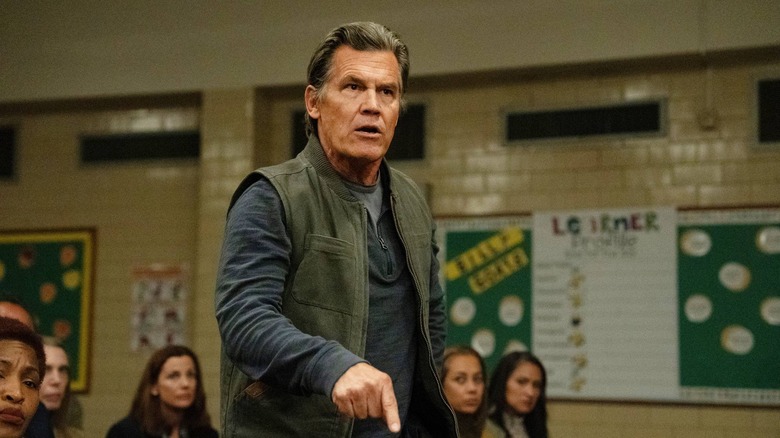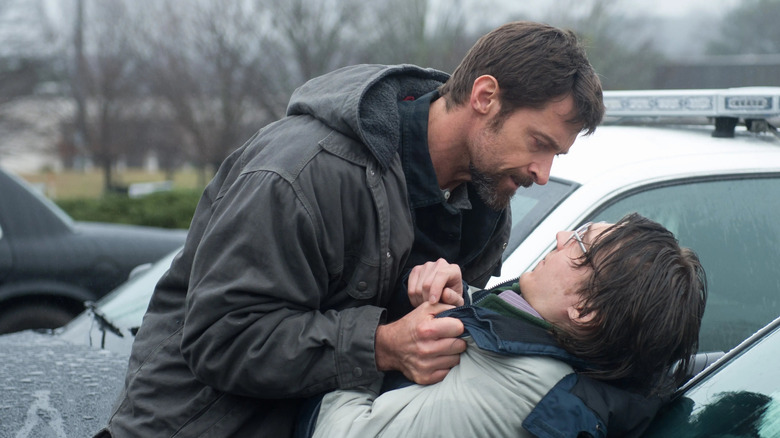Weapons Was Heavily Inspired By A Beloved Hugh Jackman Crime Thriller
This article contains spoilers for "Weapons."
Although the recent horror movie "Weapons" has already received a lot of comparisons to the 1999 thriller "Magnolia," it turns out there's another hard-hitting film director Zach Cregger took inspiration from. In a recent interview with Letterboxd, Cregger explained that it was the Hugh Jackman-led 2013 thriller "Prisoners" that drove him most of all.
"First of all, the cinematography of 'Prisoners' is so gorgeous," Cregger explained. "It's this washed-out, somber, cloudy, rainy movie. I really wanted to evoke everything visually that movie evoked, so my cinematographer and I watched 'Prisoners' and talked about it a lot when we were scouting. It's very lived-in, too—that movie feels very authentic. You know, the mess in the people's homes and all that stuff is great." In an interview with The Playlist, Cregger confirmed this connection yet again, saying, "'Prisoners' is all over this movie."
It's easy to see what he means: both are movies about a seemingly pleasant suburban town that has its world shattered by a mysterious tragedy. With "Weapons," it was the sudden disappearance of 17 children from a single classroom, a premise that harkens back to the 17 kids killed in the Parkland school shooting in 2018. With "Prisoners," the mystery is a bit more grounded, starting off as a simple kidnapping.
Although the kidnapper's motives are revealed to be more complicated than expected, and her methods less existentially terrifying than Aunt Gladys' from "Weapons," "Prisoners" is still the darker, more painful movie overall. "Weapons" backs away from its claustrophobic, angsty tone to give us a fun final act; "Prisoners" denies its viewers any such relief.
'Weapons' continues the horror trend of subverting the wholesome suburban life
Creggers explained how, in addition to taking inspiration from "Prisoners" and "Magnolia," there were also bits of "Hereditary," "Picnic at Hanging Rock," and "The Virgin Suicides" in his movie, too. "Just those kinds of suburban noirs. Those are the ones," he told the Playlist.
All these movies dwell in the idea that suburban American life, so often thought of as the ideal place for people to settle down and start a family, has something dark and poisonous beneath the surface. In "Weapons," the darkness is not only its evil witch villain, but the townspeople's isolation from one another. The witch can only do so much damage in the first place because Alex, the kid she strongarms into helping her bewitch his classmates, is bullied by his peers and neglected by the adults in his community.
There is one adult (his teacher, Justine) who tries to reach out to him, but she's been reprimanded repeatedly for helping her students outside of a strict teacher/student dynamic. Genuine human connection is discouraged in this town, which is why Alex can have his house taken over by a witch for more than a month without any of the neighbors (even those on his own street) checking in. His house is surrounded by other houses, but in this anti-social town, that means nothing.
In "Prisoners," the darkness lurking through the town isn't merely the kidnapping of the two girls, but the fact that the mentally ill Alex (Paul Dano) has been a kidnapping victim for over a decade, his suffering ignored by the community around him. The key to both films is that the horror doesn't actually begin with the story's inciting incident; with both movies, the horror's been brewing for years before the town is forced to reckon with the results.

